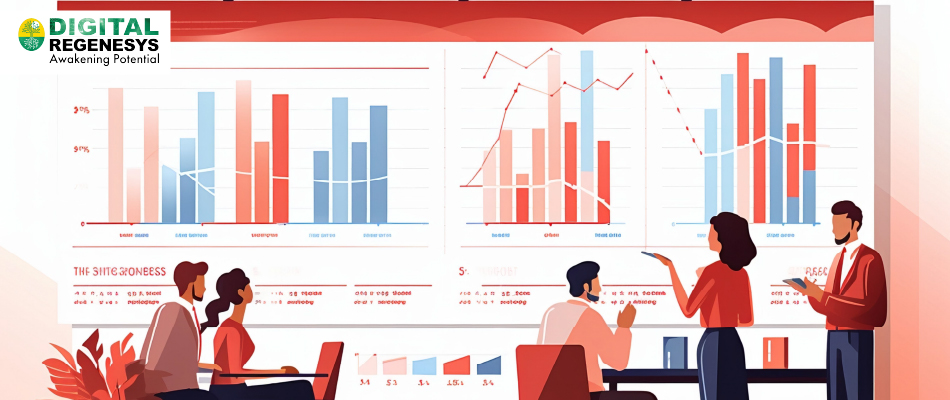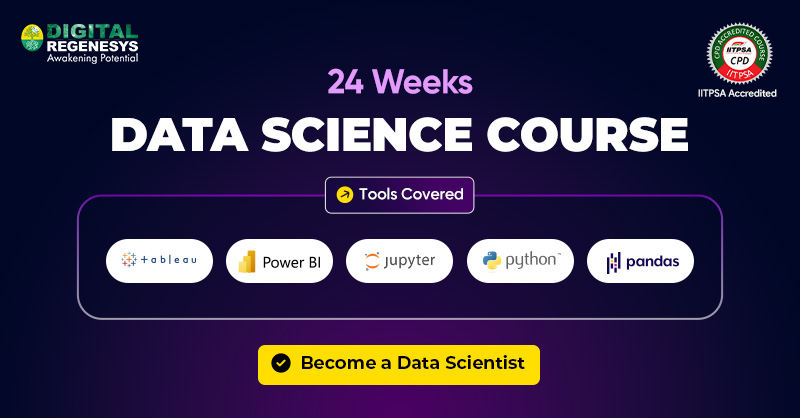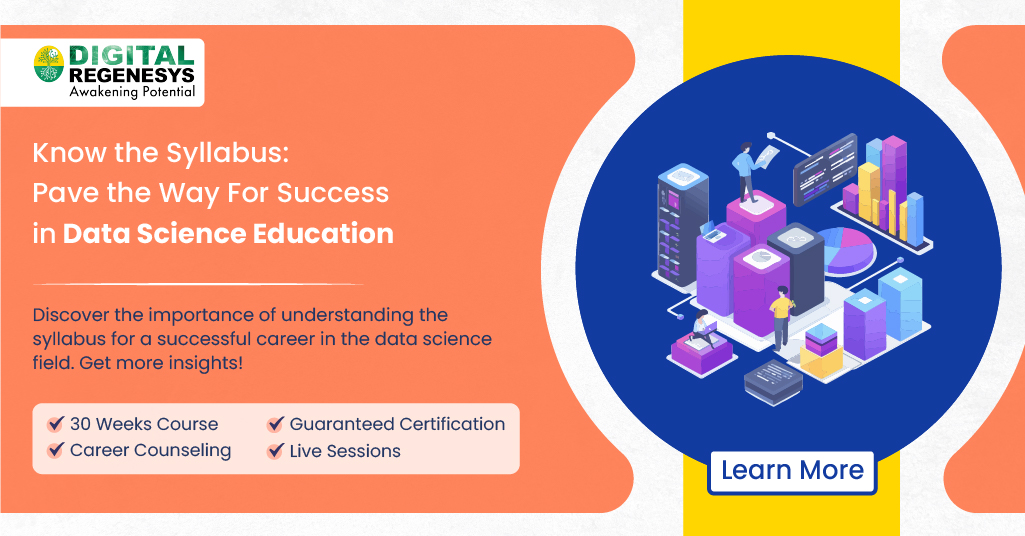Why is it important to understand the syllabus of a data science course?

Today, the data science field is considered a transformative force in the dynamic terrain of modern business. With the tremendous amount of data on the Internet, the importance of data science has become undeniable. Besides, this field is changing the ways organisations use to make decisions. As a result, today, almost every sector depends on data science solutions to make data-driven decisions.
Hence, understanding the syllabus of a data science course is crucial. Whether you are a fresher or an experienced professional, a comprehensive grasp of the syllabus guides your learning journey and maximises your educational investment. Do you want to know why understanding the syllabus is essential for anyone entering the realm of data science? Continue reading our article to gain more insights.
Table of Contents
- Top Benefits of Data Science Course
- Overview of Topics Covered in Data Science Course
- Role of Syllabus in Data Science Education
- Conclusion
- Frequently Asked Questions
Top Benefits of Data Science Course
A data science course is a game changer in the job market since it provides learners with excellent job prospects and opportunities to improve marketability and investigate various career paths. Therefore, anyone considering this career path can move forward along this track since it offers high pay, chances across multiple industries, and long-term employment stability.
Here are some of the critical advantages of enroling in data science courses:
High Earning Potential:
Data scientists are some of the highest earners in the world because of their unique skills and the growing demand for data-driven information. Hence, embarking on a data science course can lead to exciting job opportunities with excellent pay potential. Besides, individuals can secure generous salaries and appealing compensation plans by mastering data analysis, machine learning, and statistical modelling.
Career Advancement Opportunities:
Data science courses offer individuals the essential skills and knowledge needed to succeed in their careers and seize opportunities for advancement. By becoming proficient in advanced data analysis techniques, predictive modelling, and data visualisation, professionals can progress in their careers, assume leadership roles, and make impactful contributions to their field.
Knowledge Acquisition:
Enroling in a data science course helps learners engage in continuous learning and expand their knowledge. The learners will cover basic concepts through advanced techniques, obtaining a thorough grasp of data science principles. Besides, they will develop the ability to gather, assess, and interpret data efficiently with the help of tools necessary to address practical problems and guide data-informed decision-making.
In-Demand Skills Enhancement:
A course for data science is designed to help you acquire the skills employers seek in various industries. You will learn programming languages like Python and R and data manipulation tools like SQL through these courses. These courses will help you become proficient in the technical skills needed for data analysis and improve your critical thinking, problem-solving, and communication skills.

Overview of Topics Covered in Data Science Course
In a comprehensive data science course, learners will be introduced to key topics crucial for learning and implementing data science techniques. These topics may include:
- Introduction to Data Science: Discuss the field of data science, its various applications, and why it is important.
- Statistical Analysis: Cover the fundamentals of probability, hypothesis testing, and descriptive statistics.
- Machine Learning: Introduces the data science algorithms and techniques for supervised and unsupervised learning, including regression, classification, clustering, and dimensionality reduction.
- Data Visualisation: Trains tools and guides for creating informative and engaging visual data representations.
- Big Data Technologies: Gives an introduction to technologies like Hadoop, Spark, and distributed computing frameworks for handling large-scale datasets.
- Natural Language Processing (NLP): Teaches methods for analysing and processing text data, including sentiment analysis and topic modelling.
- Case Studies and Projects: Offers learners hands-on experience with real-world datasets and projects to apply learned concepts and techniques.
Role of Syllabus in Data Science Education
The data science education landscape is rapidly evolving, with new technologies and methodologies emerging every year. Therefore, understanding the syllabus of a data science course is highly important. It not only shapes your learning journey but also enhances your career investments.
Let’s explore how the data science syllabus plays a vital role in one’s educational journey:
Roadmap to Learning Pathway:
A data science syllabus serves as a guide that outlines the learning goals, subjects, and materials one will explore during the course. Hence, understanding the syllabus gives learners a clear idea of what to expect from the course, helping them prepare for the upcoming academics. Moreover, this allows learners to align their goals with the course outline, improving their ability to manage time and allocate resources efficiently.
Defines Clear Learning Goals:
By fully understanding the syllabus, learners can better plan and achieve their learning objectives. For example, they can divide the course curriculum into smaller sections, which helps them set goals and monitor their advancement. Besides, a well-organised syllabus provides essential competencies and skills for learners to develop, allowing them to concentrate on areas that match their professional goals and passions.
Enhances Collaboration and Peer Learning:
Data science courses often create a collaborative learning atmosphere where learners can participate in discussions, group projects, and peer reviews. Understanding the syllabus helps learners actively contribute to these efforts by linking various topics and exchanging valuable resources. Additionally, it promotes feedback and support from peers, enhancing the learning experience.
Leverages High-Quality Resources:
There are numerous educational resources accessible to us. However, it can be challenging to find the right resource without a clear guide. Thus, knowing the syllabus assists learners in identifying top-notch resources that match the course goals, ultimately saving time and energy. Whether it’s tutorials, coding tasks, or academic articles, a well-informed selection of resources can improve learning results and enhance the educational journey.

Conclusion
Understanding the syllabus of a data science course is more than just a requirement. In other words, it is essential for educational success. It leads learners through the details of the topic, equipping them to handle the challenges of the field with assurance. Besides, the syllabus establishes specific learning objectives, utilises resources efficiently, and keeps up with technological advancements. As a result, learners can optimise their learning capabilities, which leads to new opportunities in the ever-changing realm of data science.
However, always find the right data science online courses that offer well-structured curriculum content and syllabus. Digital Regenesys, which has a global presence in multiple countries, including the USA, South Africa, Kenya, Nigeria, India, and more, provides a holistic syllabus for the data science course that upholds practical and applied learning experience. Want to learn more? Check out our website now for more details!
FAQs – Frequently Asked Questions: Why is it important to understand the syllabus of a data science course?
Q1) What career paths can I pursue after completing a data science online course?
After completing data science online courses, you can pursue different job roles such as data scientist, data analyst, machine learning engineer, business intelligence analyst, and data engineer. These roles can be found across technology, finance, healthcare, retail, and more industries.
Q2) Are data science courses only suitable for individuals with a technical background?
Data science courses are created for all types of learners, regardless of their backgrounds or skills. Most courses include beginner-friendly modules to ensure everyone understands the basics before moving on to harder subjects.
Q3) What are the core subjects in the data science course?
The best data science courses typically include core subjects like statistics, programming (Python/R), machine learning, data visualisation, data wrangling, and database management.
Q4) How can I prepare for a data science course to maximise my learning outcomes?
You can refresh your knowledge of mathematics and statistics, learn programming languages such as Python or R, and check out some introductory materials on data analysis and visualisation. Moreover, you can review the course structure and suggested readings beforehand, setting you up for success when the course starts.
Q5)How can I determine if an online data science course suits me?
While enroling in online data science courses, it’s essential to think about your career goals, interests, and how you like to learn. Look at the course’s curriculum and faculty expertise to see if they match up with what you’re looking for. You can also check some introductory courses and free resources to see if data science is something you’re interested in before you sign up for an entire course.
Last Updated: 8 September 2025
